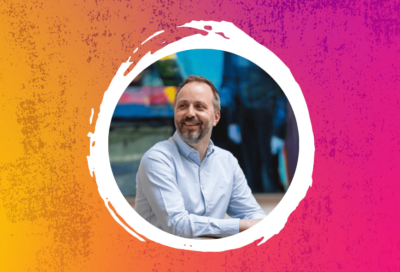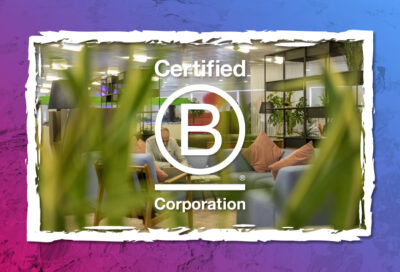When it comes to the B Corp movement, the importance of purpose has never rung truer – or been more important – and by chatting with a group of barnstorming B Corp business leaders, we’ve been treated to insights, advice and ideas that we’d love to share with you.
But first, for those of you newer to the term ‘B Corp’, let’s take it from the top:
WHAT IS A B CORP?
B Corps are businesses putting people, planet and profit on the same plane. They’re redefining success and using growth as an opportunity to make a wide-reaching, long-lasting, positive impact on their employees, communities, and the environment.
HOW TO BECOME A B CORP
To become B Corp Certified, your business has to score 80 or more in the “B Impact Assessment”, graded by not-for-profit, B Lab. The assessment is designed to help measure and manage your social and environmental impact at every level, across all stakeholders, customers included – a journey we’re currently on here at Cooper Parry.
In 2007, the first 82 B Corps were certified. Today, there are over 3,500 Certified B Corporations in more than 70 countries, including household brands like Patagonia, Ben & Jerry’s and Innocent Drinks.
That number isn’t enough; nor will it ever be. And while these big-name brands are no doubt impressive acts to follow, spotlighting them is kinda pointless. Because they’re not relatable.
Much better to focus on what smaller, growing businesses can learn from each other’s experiences of the process – and how those learnings can shape your own B Corp journey – which may be just about to start.
TWO ROUNDTABLES. ONE FORCE FOR GOOD BANNER
To tap into those insights, John Maffioli and April Bembridge, our Chief People Officer, co-hosted two intimate roundtable chats alongside Galahad Clark, CEO, and Emma Foster-Geering, Director of Sustainability, from the awesome B Corp barefoot shoe company, Vivobarefoot.
The guests? Business leaders at every stage of the B Corp process, from the initial, piqued-interest, toe-dipping phase, all the way through to those first certified years ago.
The discussions? Everything we’d hoped for. Fast-paced. Nugget-filled. With some stellar advice for growing business leaders from people who understand and appreciate what it’s like to be in their shoes, first-hand.
A few key themes popped up. You’ll find them below. Enjoy.
FORGET THE BADGE. ENJOY THE RIDE
The most impactful part of the B Corp process, mentioned by all our guests, wasn’t about being certified at all. It was the learning and the chance to re-think, re-imagine and improve every aspect of your business through the impact assessment’s wide-reaching lens.
Made up of around 200 questions, the assessment and its criteria are stringent to stamp out greenwashing, so don’t be fooled into thinking you can achieve B Corp status in a matter of weeks. Most of our guests said it took them in the region of a year, but, as Nick Proctor, Founder and CEO at energy management consultancy, Amber Energy, emphasised, “The game’s up as soon as you think you’re there – it has to be a continual push for improvement”.
For Emma, the question of whether a business should look into B Corp rests heavily on the ‘why’:
“Are you doing B Corp for marketing purposes to show the world you care? Or are you doing B Corp because you’re genuinely interested and invested in what it can achieve? Are you looking for a badge? Or are you actively trying to get to a point where your entire business is running off renewable energy?”
“It’s not about getting the accreditation,” April added, “That’s the by-product. It’s about making the B Corp mindset an intrinsic part of how you do things in your business.”
B Corp isn’t a tick-box exercise. You can’t throw money at it to make things happen straight away. It takes time, patience, effort and belief, and as Tom Kay, Founder at outdoor clothing brand, Finisterre, pointed out, so it should:
“B Corp is a positive force for ourselves, our purposes, our businesses. It’s about doing things in a slower, better, stronger way. There’s an emotional graft attached to the journey, but it makes it more rewarding.
“You have to make tougher choices to stick to your ‘why’. Sometimes, they might make things harder economically, but they become easier. You have to commit to the journey and what you believe in. You have to be brave.
“We’re the converters. And we need to rally each other on, ask the questions together and do better alongside other businesses and customers.”
THE BENEFITS OF B CORP
ENGAGING YOUR PEOPLE. ATTRACTING THE BEST TALENT
“B Corp brings your entire company together as a community,” Emma told us, “It brings everyone together under one mission, with total legitimacy. It’s not just some bullshit brand value piece, it’s an amazing community programme that will make your company much better in the future.”
The notion of ‘walking the walk’ and showing their commitment to keep doing so was touched on by a number of our guests, and by having a flag to fly and align with their values, they not only reaped the rewards internally, but in their recruitment efforts, too.
“Our main customer is the NHS, and they don’t give a stuff whether we’re B Corp or not,” James Kraft, Founder and CEO at Standing CT shared, “But where we have seen a significant improvement is when we’re recruiting. When we talk to people about why we’re a B Corp and how it affects everything we do, that makes a massive impact.”
DOES BEING A B CORP BOOST PROFITS?
Waitrose and Ocado have both made headlines in recent times by creating dedicated online B Corp ‘aisles’ – sections of their websites devoted solely to B Corp brands and their products. But does becoming B Corp Certified boost profitability?
None of our guests could say with conviction that it did. After all, it’s hard to quantify something like that. And it’s important to note here that there is a cost attached to becoming a B Corp, depending on your revenue, but our leaders agreed it was a worthwhile investment.
Why? Well, it all came back to the learning:
“Sustainability is no longer an edge in fashion and footwear,” said Emma, “So, has it helped us gain more followers and customers? I don’t really know. Has it helped us get our shit together internally? Absolutely. It’s given us clear policies, clear frameworks, and a clear vision about how to get the business moving forward. It’s brought people together, and now, every job description, every departmental metric is linked to B Corp and the impact assessment to improve what we do.”
“I don’t think it has a massive impact on profitability in the end,” Galahad added, “But what I am interested in is how to create a standardised playing field. Trust is important if the consumer is ever going to be invested in these things. So, I’m interested in how B Corp can help more businesses measure their impact at more regular intervals.”
WHAT DO INVESTORS THINK OF B CORPS?
The answers to this question were much more clear-cut. Investors love B Corps – these “slower, better, stronger” businesses that are typically well-managed, low-risk, attractive investments.
One of our guests, Luke Lang, Co-founder and CMO at crowdfunding equity platform, Crowdcube, said they had four of their five most successful campaigns ever in 2020, driven by a keen interest in purpose:
“The B Corp ethos – community, taking all stakeholders including customers into account – is really aligned with crowdfunding. The businesses want their supporters to play a part in their journey, and lots of B Corp Certified businesses have had successful raises through our platform.”
What’s more, William Pearson, Co-founder and CEO at reusable bottle brand Ocean Bottle, said because of the growing interest in impact investments, being a B Corp was “very useful” in a recent successful fundraise, which actually saw them oversubscribed towards the end of the process.
BUT, B CORP ISN’T PERFECT
“B Corp is the best, but it’s not perfect yet,” William continued, “I’ve found it to be geared towards larger companies who are doing less damage”, and he hopes that B Corp will raise the bar even further in the future and focus on companies who are creating positive, regenerative impact.
Because right now, are the big businesses getting accredited actually doing any good for society and the planet? Or are they simply doing less damage than their peers?
This need for businesses to go beyond sustainability to become truly regenerative – giving back more to society and the planet than they take away – echoed points made by Galahad in a podcast we did with him previously; beliefs driving Vivobarefoot’s own regeneration journey.
B Corp needs to keep levelling up to remain legitimate and push businesses to go further – especially those with their foot already in the door. But at the same time, can the impact assessment in its current state already feel overwhelming for purpose-driven early stage businesses that are short on time and resource?
Sarah King, Co-founder at the women’s entrepreneurship platform for leaders and investors, we are radikl, thought it could. Sarah referenced conversations she’d had with women leaders in her network, saying that whilst the majority of small business owners they work with want their businesses to be a force for good, there can be a sense of ‘where to start’ with the current impact assessment, meaning greater accessibility for small business owners feels like a real opportunity.
Emma said, “If you’re a small business and the process is intimidating, there are so many wonderful organisations out there that can help companies with this kind of thing, often pro bono,” but clearly, the right balance between excellence and accessibility has to be struck, with Nick Proctor pointing out:
“We need a certain mass of businesses all doing the right thing to find the right balance on our planet. We need a standard that stands for something and helps by passing on information so others can start their journey and start to make a difference. It can’t be a VIP club where we think we’re above everyone, it needs to be about convincing others to start their own B Corp journey.”
SO, SHOULD YOU START YOUR B CORP JOURNEY?
If you have a genuine belief in the movement’s potential and what it stands for – and that ties into your company’s values, definitely. It’s a fantastic opportunity to re-invent your approach and leave a legacy that goes beyond profit. A legacy of positive, long-standing, important change.
Getting the buy-in and support of your leaders helps a lot to get the process off the ground, with Galahad and Emma’s drive at Vivobarefoot being a case in point. And we heard some great examples of how to make B Corp intrinsic to your day-to-day, including linking every job description and departmental metric to the impact assessment, plus, this idea from Heather Lynch, Sustainability Manager at the anti-waste food subscription box business, Oddbox:
“Our end of year goals include improving our B Corp score, and we’re laying out how everyone can contribute to improving that to make it really inclusive. Then, 25% of our peoples’ bonuses will be linked to our B Corp score and how much it’s improved by.”
Sure, the B Corp process takes time. But every journey worth travelling – and every challenge worth overcoming – does. And right now, more than ever, our planet and our future generations need us to embark on this one, together.
So, if you’d like to chat about anything B Corp and swap some ideas, let us know. And in the meantime, why not listen to April chatting to Emma Foster-Geering in our No Bull Podcast episode, “What is B Corp? Fad, or full-fledged force for good?”, which clocks in at a suitably succinct 27 minutes.























